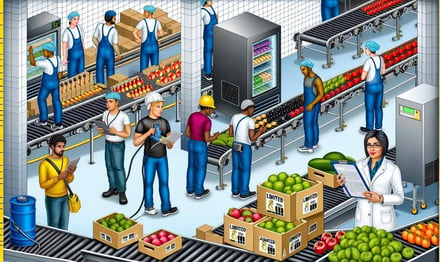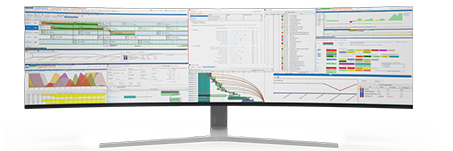Fuzzy Logic-Scheduling for Perishable Goods Production
In the Food and Beverage (F&B) manufacturing industry, where precision and efficiency are essential, the scheduling of production processes plays a pivotal role. The challenges are intensified when dealing with perishable goods, where factors such as shelf life, demand fluctuations, and production intricacies demand a nuanced approach.
This blog explores the revolutionary application of fuzzy logic in scheduling for perishable goods production, emphasizing its seamless integration with Manufacturing Execution Systems (MES), Enterprise Resource Planning (ERP), and Supply Chain Management (SCM) systems.

The Perils of Perishable Goods Production
The F&B sector is no stranger to the complexities of perishable goods production. Managing the delicate balance between demand variability, stringent timelines, and the inherent perishability of raw materials poses a constant challenge. Traditional scheduling methods often fall short in adapting to the real-time demands and uncertainties that characterize the industry. This is where the infusion of fuzzy logic into scheduling processes emerges as a game-changer.

Fuzzy Logic: A Primer
Fuzzy logic, a mathematical framework that deals with uncertainty and imprecision, is finding its stride in manufacturing IT. Unlike traditional binary logic that operates in absolutes of true or false, fuzzy logic introduces a spectrum of possibilities, allowing for a more nuanced decision-making process. In the context of scheduling for perishable goods production, fuzzy logic excels at handling the inherent vagueness associated with factors like demand forecasts, production rates, and resource availability.
The Benefits of Fuzzy Logic in Scheduling
Adaptive Decision-Making: Fuzzy logic's ability to handle imprecise data enables adaptive decision-making in real-time. This is particularly crucial in the F&B industry, where demand can fluctuate unexpectedly, and the scheduling system needs to quickly adjust to maintain optimal production levels.
Improved Accuracy in Forecasting: Perishable goods production requires accurate forecasting to minimize waste and meet consumer demands. Fuzzy logic's ability to model and process uncertain information enhances the accuracy of demand forecasts, enabling manufacturers to align production schedules more effectively.
Enhanced Resource Optimization: Fuzzy logic optimally allocates resources based on the varying degrees of necessity, considering factors such as machine availability, labor constraints, and material availability. This ensures a streamlined production process, reducing downtime and improving overall efficiency.


Integration between PlanetTogether and ERP systems
To fully unlock the potential of fuzzy logic in perishable goods production scheduling, seamless integration with Manufacturing Execution Systems (MES), Enterprise Resource Planning (ERP), and Supply Chain Management (SCM) systems is essential. One notable integration is between PlanetTogether, a leading advanced planning and scheduling solution, and prominent ERP systems like SAP, Oracle, Microsoft Dynamics, Kinaxis, Aveva, and others
PlanetTogether and SAP Integration
The integration of PlanetTogether with SAP brings forth a harmonious collaboration between advanced scheduling capabilities and robust ERP functionalities. Real-time data exchange ensures that the scheduling decisions made through fuzzy logic align seamlessly with SAP's resource planning, resulting in a synchronized and efficient production process.
PlanetTogether and Oracle Fusion Collaboration
The collaboration between PlanetTogether and Oracle Fusion provides a comprehensive solution for F&B manufacturers. Fuzzy logic-driven scheduling optimizes production plans, while Oracle Fusion's ERP capabilities handle financials, procurement, and other critical aspects of the business.
Microsoft Dynamics and PlanetTogether Synergy
Fuzzy logic scheduling through PlanetTogether, when integrated with Microsoft Dynamics, bridges the gap between production and business processes. This integration allows for a holistic view of operations, facilitating better decision-making and resource utilization.
Kinaxis RapidResponse and PlanetTogether Integration
Kinaxis RapidResponse's supply chain planning and monitoring capabilities seamlessly integrate with PlanetTogether's fuzzy logic-driven scheduling. This integration ensures that changes in the supply chain are immediately reflected in the production schedule, maintaining agility and responsiveness.
Aveva and PlanetTogether
The integration between Aveva's comprehensive MES system and PlanetTogether's advanced scheduling solution creates a powerful synergy. Fuzzy logic scheduling adapts to real-time production data from Aveva, ensuring that the MES system and the scheduling process work hand in hand for optimal results.
The adoption of fuzzy logic in scheduling for perishable goods production represents a paradigm shift in the F&B manufacturing industry. Its ability to navigate uncertainty, coupled with seamless integration with advanced planning and ERP systems, positions it as a transformative force.
Manufacturers leveraging solutions like PlanetTogether in tandem with ERP giants such as SAP, Oracle, Microsoft, Kinaxis, and Aveva gain a competitive edge, ensuring a responsive, adaptive, and optimized production process.
As the F&B industry continues to evolve, embracing innovative technologies like fuzzy logic becomes not just a choice but a necessity for those aiming to stay ahead in the fast-paced world of perishable goods production.